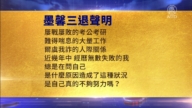【新唐人2011年8月12日讯】随着大陆城市化、工业化速度加快,农村土地大量被征用,据中国社科院的报告,目前中国“失地农民”达4千万到5千万人,并且每年以约3百万人速度递增,估计到2030年将达到1亿1千万人。由于,中共当局在城市化过程中,对农民就业转型和生活保障上缺乏完善的规划,造成了严重的社会问题。
据长期帮助失地农民维权的天理表示,经过他手上的失地农民,光是福建和广东就超过了20万人,他说,5千万被说“小”了,现在的当局已经成为卖地政府了。
天理(政论作家):“这几天连安徽、合肥失地农民也找到我,我看到资料真的太惨,我觉得中国农民是全世界最惨的人群,他们其实给这个社会、给这个国家抛弃了。我自己现在心情很凝重,5千万那个数字肯定说“小”了。”
本台资深评论员文昭表示,以中国现在制度来讲,政府想搞一个开发,像是修一条高速公路、修一个水电站、一个工业园区,那么就要征收农民土地。文昭分析,有些城市卖地收入甚至已经占政府财政收入40%以上。他表示,在现有土地开发完以后,当局就要再找新的增长点,那么农民就成了掠夺的对像。
另外还有一个问题是,中共当局过度追求GDP。
文昭:“GDP增长,地方政府主要是靠土地经济,主要是去卖地,而且越是发达的省分它的土地开发价值越高,所以说他就越依赖土地财政。”
根据国土资源部的资料,全中国城镇规划范围内闲置、空闲和已批示未供用的土地有26.67万公顷,大规模征地但低效利用的现象严重。农民失地后生活没了保障,大多依靠征地补偿金和其他救济金或打零工过活,造成严重社会问题。据统计,有三成农民上访都和征地有关。
文昭点出,中国征地问题主要在于“补偿是否合理”。
文昭:“农民的问题是,他现在不享有社会保障,没有事业保险,他没有养老保险,基本上也没有医疗保险,几乎可以说没有医疗保险,土地是他的全部生活来源,他失去了土地他就失去了经济来源,那么他就成为游民,他可能他唯一出路就是进城打工,他就再没别的出路了。”
文昭表示,中国另一个征地问题是“就业出路”问题。他说,补偿足够的话,能够解决今后大多数的生活急难,如果能在城市提供原乡农民更多就业机会,社会矛盾才会减少。
然而,据大陆统计局对失地农户的抽样调查,征地后安置就业的仅占2.7%;外出务工的占24.8%;经营二三产业的占27.3%;从事农业约占25.2%;空闲在家的约占20%。。
另外,中国各级政府对于农民补偿款贪污、挪用、拖欠等问题相当严重,农民在没有失业保险也没有养老保险的状况下,又失去了生活来源的土地,并且拿不到补偿款,这就造成了今天中国社会矛盾冲突频发的主要原因。
新唐人记者梁欣、李庭、周平采访报导。
====
50 Million “Landless Farmers"
With China’s urbanization and industrialization,
vast amount of rural land has been expropriated.
Chinese Academy of Social Sciences’ report shows
that now China has 40-50 million “landless farmers,"
and every year about 3 million farmers loose land.
It is estimated that by 2030 they will reach 110 million.
In the urbanization process, authorities do not have job
alternative for farmers, causing serious social problems.
Tianli assists landless farmers to safeguard their rights.
He helped over 200,000 people
in Fujian and Guangdong Provinces alone.
He said that 50 million is “underestimated."
And now the Chinese government has become
a land-selling government.
Tianli (political commentator): “Recently, farmers,
who lost their land, in Hefei and Anhui, came to me.
I read their materials; it was just so miserable.
I think Chinese farmers are the most miserable group.
They are abandoned by both the state and the society.
I have a heavy heart right now, and I think
that 50 million is definitely an “underestimate."
NTD senior commentator Wen Zhao said
that under China’s current system,
when the government wants to engage in land
development, such as building a highway,
a hydropower station, or an industrial park,
they would expropriate farmers’ lands.
Wen Zhao said, for some cities, revenue from land sales
accounts for more than 40% of government’s revenue.
He said that after completion of existing development,
the authorities will look for a new growth area.
Thus farmers become an incessant object of plunder.
Another issue is that the Chinese communist regime
is too much after the GDP growth.
Wen Zhao: “For GDP growth, local governments mainly
rely on land economy, and they mainly sell land.
The more economically advanced a province is,
the higher the cost of its land.
So they rely more and more
on land sale for fiscal revenue."
According to China’s Ministry of Land, 266,700 hectares
of land has been assigned for urban planning.
The land is either idle or instructed not to use.
The problem of a large-scale poorly used land is serious.
The farmers without land have nothing to rely on.
Most of them count on land acquisition compensation.
This leads to serious social problems. Statistics show that
about 30% of petitioners are farmers, who lost their lands.
Wen Zhao pointed out that the issue of China’s expropriation
depends on “whether the compensation is appropriate."
Wen Zhao: Farmers have no social security,
unemployment benefits, pensions or health insurance.
Land is usually the only source of their income.
So when they lose their land, they lose all sources
of income and become homeless.
Their only way out is to seek jobs in the cities;
they have no other choice."
Wen Zhao believes that China’s other issue
is the lack of “employment opportunities."
He said if the compensation is sufficient,
this can solve emergency issues for most people’s lives.
If their hometowns can provide more employment
opportunities for farmers, social conflicts will decrease.
However, according to a sample survey conducted
by the Bureau of Statistics on landless farmers,
only 2.7% of farmers, whose land was acquired,
have employment arranged for them;
24.8% migrated to work out of town; 27.3% started
their own business in industries or service sectors;
25.2% worked on farm lands
and about 20% were idle at home.
In addition, all levels of Chinese governments have
serious problems in dealing with farmers’ compensation,
due to corruption, embezzlement and delayed payment.
Without unemployment insurance and no pension plan,
farmers now lose their land, the source of livelihood,
and yet they cannot get substituting compensation.
This is a major source of frequent social conflicts today.
NTD reporters Liang Xin, Li Ting and Zhou Ping.




























